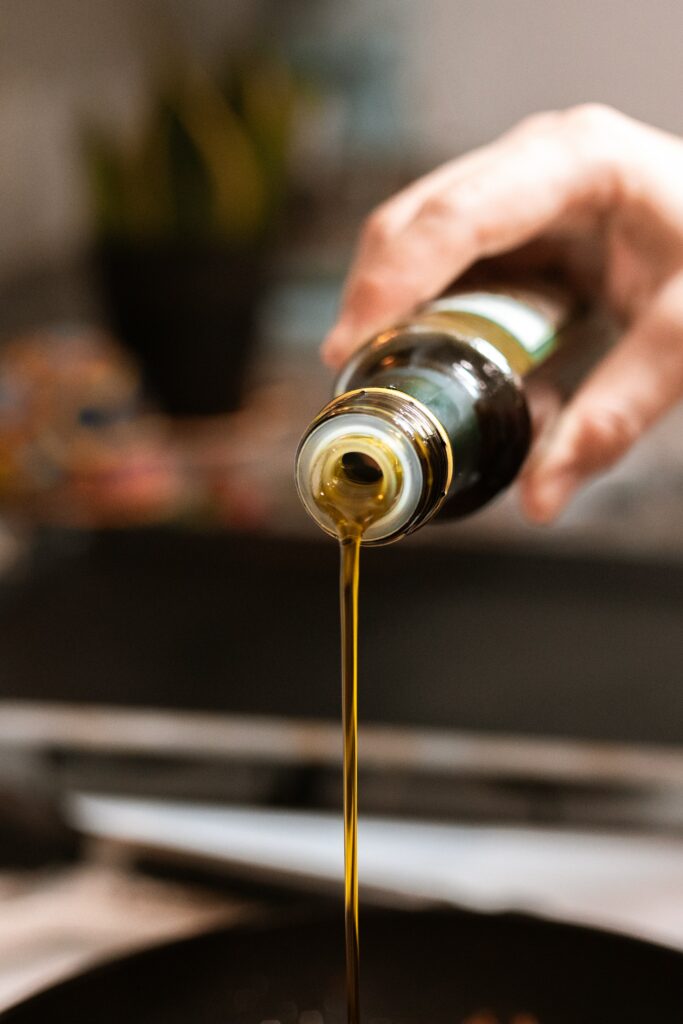THE BIG FAT PROBLEM
By Anthony Warner, also known as The Angry Chef
I was a restaurant chef for just over 12 years and I got to be a pretty good one, working in various establishments across the Northwest of England and London. Although I was never going to change the world, it was quite the ride. I fed rock stars and Prime Ministers, ate like a king, lived like a pauper, had half a dozen hospital visits, and once argued with Tony Curtis about how a medium steak should be cooked.
But eventually, as is the case with many in the profession, the draw of fewer split and weekend shifts, and of a job that might be a little kinder on my ageing body, landed me in the role of development chef for a large food manufacturer. I progressed quickly and within a few years I became Head Innovation Chef of the UK’s largest food manufacturer, developing recipes eaten in millions of homes. Now my food probably still ends up being eaten by Prime Ministers and rock stars – but in a very different way. And I’m less likely to argue with Tony Curtis than I am with my arch nemesis, the company nutritionist.
Why this conflict? I had a lot to learn when I transitioned from my previous life in restaurant kitchens to the very different concerns of the everyday family dinner table. As a nation, the majority of households still relies hugely on pre-packaged convenience foods for their daily diets, meaning that manufacturers of these foods, such as myself and my employer, have a huge responsibility to consider the health of their customers – something that restaurants typically don’t consider.
I had to completely relearn how to deliver restaurant-quality flavour. As I soon found out, many of my most delicious dishes contained so much fat, salt and saturated fat that I was frequently asked if the Excel spreadsheet had made some sort of error. It turns out that when you reduce down a sauce with double cream and finish it by emulsifying in a handful of butter, the amount of saturated fat is enough to make the nutrition team want to take early retirement.

I am now often asked why restaurant food is so much more delicious than home cooked or shop bought dishes, and when the answer is not salt (the topic of another article perhaps), then it is probably fat. In restaurants, butter and olive oil would sit by the stove, whisked into sauces just before serving to add richness, gloss and indulgent flavour. Double cream would be slugged into pans and reduced down to accompany meats and fish, which in turn were cooked in liberal amounts of butter and oil. The quantities added were often unchecked, the focus entirely on flavour and indulgence.
When I had to monitor and calculate it, the amount of fat I was adding was a little bit shocking.
Sure, my restaurant customers were there for a good time, not a long time, but sometimes they were getting a week’s RDA of saturated fat on one plate. I am aware that since my time things have moved on somewhat in restaurants, where both restaurant trends and customer tastes increasingly demand a move towards fresh, vegetable-heavy cooking; and in recent times, perhaps the current cost of butter and cream has pushed things a similar way in better value sites. But I am also pretty sure that if we nutritionally analysed most restaurant cooking outside of the major chains, it would fare pretty badly when it comes to traffic light labelling or HFSS regulations. Which is probably the exact reason why consumers love to eat out.
This might not be the end of the world. Restaurants, at their best, are for occasional indulgence, an afternoon or evening of celebration and pleasure. Customers should leave feeling spoiled and indulged, and their time at the restaurant table should be free from guilt or nutritional recrimination. But when it comes to the everyday, pre-packaged foods that I work on as a development chef, the ones that fuel our nation’s diet, including pasta sauces, gravies, stock cubes, curry pastes and soups, there is a need to make things better. As a development chef, you need to up your nutritional game.
You learn some new tricks. The clever use of different starches can make a little bit of fat go a long way, delivering a creamy mouthfeel to sauces without the nutritional headache. There are tricks you can play with emulsification, making the most of the small amounts of butter, cream, or olive oil you are allowed. But it’s not always a case of increased processing, which can come with a whole different set of problems and concerns – one thing you learn when you reduce fat is that as you do so, other flavours come through far more strongly. You can use this to create a brilliant product, but you need to think about it differently. Spices, aromas, acidity and savouriness are all more easily perceived in lower fat recipes, meaning that you will often need to rework or rebalance to achieve the same results.
Although there are some clever natural flavourings that can deliver fattiness and creaminess, the best results almost always come from reworking of recipes. My mantra for nutritional reformulation is that it usually requires a complete revamp, rather than the tweaking of a single ingredient. A pasta sauce with some of the fat and salt removed will never taste as good – but if you dial up other flavours, a bit more lemon, a tweak to the knowledgeable chef to create something people love just as much. Fat in cooking, it turns out, is often a comfort blanket for chefs, helping us deliver something delicious on demand, without really thinking. The challenge of cooking with less fat has led to some of the food I am most proud of in my career. I have removed tonnes of fat, salt, and saturated fat from the UK diet, without (and there is considerable consumer data to back this up) reducing the pleasure or perceived indulgence people get from their food.

In recent years my work has shifted towards consultancy, and the group I work with now is entirely focused on creating a more sustainable, healthier food system. Much of this is trying to help that system shift towards more plant-based foods. As a chef, this involves addressing the huge quality gaps between plant-based meats and dairy when compared to their animal derived equivalents.
Until recently, this work has focused on the issue of plant-protein sources, but increasingly our attention is turning to fats. If you want to make plant-based burgers or cheese similar to beef burgers or a standard cheddar, matching the sort of hard, highly saturated fats derived from animals is a huge challenge. This has pushed the industry towards a small selection of tropical oils such as palm, coconut, and shea, yet none of these are ideal when it comes to health, taste, sustainability, and long-term viability of supply. The industry desperately needs more and better options, yet there are few on the horizon.
I often describe this ‘Big Fat Problem’ as the biggest unspoken challenge in food. Most sensible commenters who understand the environmental challenges in the global food system agree that we (and by ‘we’ I mean the population of most rich nations of the world) need to dramatically reduce the amount of meat and dairy we consume. By default, that will mean hugely increasing our consumption of plant-based products, but if the fat portion of those options is from non-sustainable crops, particularly those that threaten tropical ecosystems, we risk jumping from an animal derived frying pan into a plant-based frier (for once, my metaphors really check out).
It is a complex problem, and the solution will probably be a complex one. There is unlikely to be a silver fat-bullet (not such a good metaphor, but still works), a new type of oil that changes the game. Precision fermentation of novel fats will be talked about, and will no doubt receive much investment, but it is unlikely that this will ever be delivered at a scale that offers a global solution. Chemical hydrogenation of oils can do some interesting things, but although it is possible to do this safely, the trans-fat scandal of the 1990s means that it is unlikely to ever be acceptable to consumers.
In truth, the solution will probably come from where most food industry problems are quietly resolved, in development kitchens around the world. Just as trans fats have been removed from most UK food products, and salt dramatically reduced over the past 20 years, the plant-based fat issue will slowly and incrementally be worked on. There is room for some sustainably produced palm, coconut and shea, and these can be incorporated, using clever product development to limit their use. New emulsification techniques to reduce total fat levels and novel ways of combining tropical oils with more sustainable options will be developed. Some of the fancy new fermentation derived fats will no doubt find their place.
Perhaps most significantly, new ways of helping consumers enjoy plant-based products will be created. Most people in the industry agree that a shift is coming, a move from trying to make plant-based versions of meat and cheese, towards creating new products that offer the convenience of burgers, bacon and nuggets, but celebrate the flavours and textures of vegetables. This is a good step, and part of a wish-list of more ideal solutions, such as improving education and accessibility to fresh foods which reduce reliance on pre-packaged convenience items. But alongside that perhaps, if us product developers can increasingly use our skills for good, we can develop products that do not need so much hard fat, and instead can incorporate more sustainable, healthier, locally produced oils.
It will be a challenge for sure, but that is what gets us development chefs up in the morning. Beef burgers and cheddar are popular because they are delicious, and consumers will be loath to let them go. But one thing I have learnt, after many years in restaurants and even longer in development kitchens, is that the thing that really drives people to consume is how good something tastes. Sustainability and health are nice conversations to have, but change will only happen when the healthy, sustainable options are the most delicious and desirable. That is going to require development chefs to up their game. So perhaps what I have really learnt over the years, is that there are some ways in which us chefs might just change the world.
